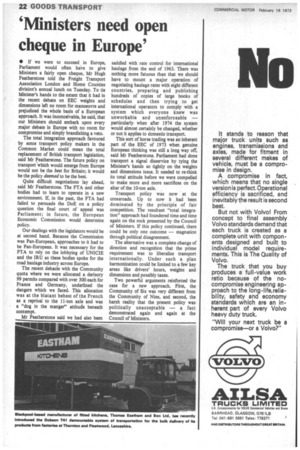'Ministers need open cheque in Europe'
Page 24

If you've noticed an error in this article please click here to report it so we can fix it.
• If we were to succeed in Europe, Parliament would often have to give Ministers a fairly open cheque, Mr Hugh Featherstone told the Freight Transport Association London and Home Counties division's annual lunch on Tuesday, To tie Minister's hands to the extent that it had in the recent debate on EEC weights and dimensions left no room for manoeuvre and prejudiced the whole basis of a European approach. It was inconceivable, he said, that our Ministers should embark upon every major debate in Europe with no room for compromise and simply brandishing a veto, The total integration approach favoured by sonic transport policy makers in the Common Market could mean the total replacement of British transport legislation, said Mr Featherstone, The future policy on transport whichwould emerge from Europe would not be the best for Britain; it would be the policy deemed to be the best.
Quite difficult negotiations lay ahead, said Mr Featherstone. The FTA and other bodies had to learn to operate in a new environment. If, in the past, the FTA had failed to persuade the DoE on a policy question the final court of appeal was Parliament; in future, the European Economic Commission would determine policy.
Our dealings with the legislators would be at second hand. Because the Commission was Pan-European, approaches to it had to be Pan-European. It was necessary for the FTA to rely on the lobbying of UNICIE and the IRU as these bodies spoke for the road haulage industry across Europe.
The recent debacle with the Community quota where we were allocated a derisory 99 permits compared with over 300 each for France and Germany, underlined the dangers which we faced. This allocation was at the blatant behest of the French as a reprisal to the 11-ton axle and was a "dog in the manger" attitude beneath contempt.
Mr Featherstone said we had also been saddled with rate control for international haulage from the end of 1963. There was nothing more fatuous than that we should have to mount a major operation of negotiating haulage rates with eight different countries, preparing and publishing hundreds of copies of large books of schedules and then trying to get international operators to comply with a system which everyone knew was unworkable and unenforceable — particularly. when after 1974 the system would almost certainly be changed, whether or not it applies to domestic transport.
This sort of horse trading was an inherent part of the EEC of 1973 when genuine European thinking was still a long way off, said Mr Featherstone, Parliament had done transport a signal disservice by tying the Minister's hands so tightly on the weights and dimensions issue. It needed to re-think its total attitude before we were compelled to make more and more sacrifices on the altar of the 10-ton axle,
Transport policy was now at the crossroads. Up to now it had been dominated by the principle of fair competition. The resultant "total integration" approach had foundered time and time again on the rock presented by the Council of Ministers. If this policy continued, there could be only one outcome — stagnation through political disagreement.
The alternative was a complete change of direction and recognition that the prime requirement was to liberalize transport internationally. Under such a plan harmonization could be limited to a few key areas like drivers' hours, weights and dimensions and possibly taxes.
Two powerful arguments reinforced the case for a new approach. First, the Community of Six was very different from the Community of Nine, and second, the harsh reality that the present policy was politically unacceptable — a fact demonstrated again and again at the Council of Ministers.












































































































